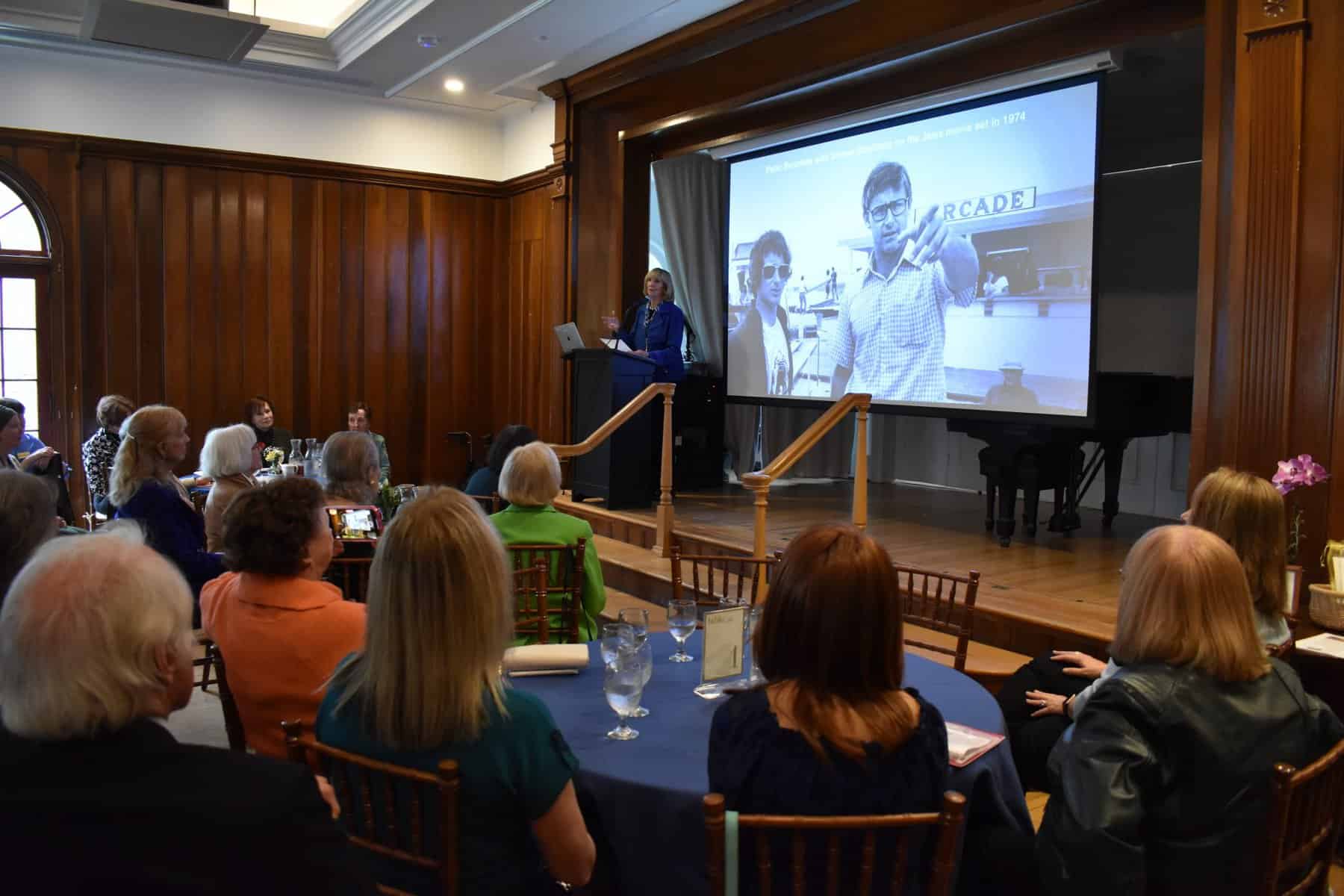Wendy Benchley, former three-term Princeton Borough councilwoman and wife of the late author Peter Benchley, has been committed to protecting Earth’s oceans for decades.
Benchley, who currently lives in Washington, D.C., returned to Princeton recently to conducted a presentation at the Present Day Club about ocean conservation and current efforts by organizations to combat ocean and shark population issues facing the world today.
The ocean conservationist and marine policy advocate held the presentation and discussion with members of the Present Day Club and their guests on May 4 at the club’s location on 72 Stockton St.
“The Present Day Club has been a center of thought and action for women in Princeton for almost 130 years and our weekly speakers lunch is one of the main focuses of what we do as a club,” said Cecelia Tazelaar, president of the Present Day Club. “We have had some outstanding speakers in all different spheres – politics, art, and culture. It was wonderful to have Wendy [Benchley] speak to the Present Day Club, because Wendy and the Present Day Club are Princeton institutions.”
She added that the club is a community of like-minded women who value education, women’s achievements and women having an impact in the world.
“Wendy epitomizes that,” Tazelaar said.
The success of Peter Benchley’s novel “Jaws” was a complete surprise to Peter and Wendy, but changed their lives completely because they were able to go on wonderful expeditions around the Earth’s oceans, Wendy said.
With the impact of “Jaws,” they both became deeply involved in learning about sharks and conservation issues.
“One hundred million sharks are killed every year, mainly for shark fin soup. For those of you who do not know these fins are cut off of millions of sharks by hand,” Benchley said. “They capture the shark and chop off the fins and throw the live shark back in to die this painful and slow death.
She added that we need our sharks.
“They keep the ocean food chain in order, but half of all species are now listed as endangered or critically endangered. Destroying them is a recipe for long-term ocean decline not just for sharks, but for the entire ocean,” Benchley said.
Benchley serves as a board member to wildlife and ocean organizations WildAid, Beneath the Waves, and Blue Frontier.
“I think the ocean has become a top concern for people along with climate. Climate and the ocean are intricately connected, because you know the ocean is a carbon sink. Over the last 10 years there has been a huge upswing not only in dollars given to ocean causes, but also in the number of people looking to create marine-protected areas around the world. Then the number of governments working now on plastic pollution, overfishing and so many issues. We are now really moving in a faster pace on ocean issues.”
Benchley sees top ocean issues as overfishing and climate change.
“Overfishing is really the biggest issue we have and if governments would stop subsidizing these factory ships it would go a long way to helping us keep the ocean healthy and thriving,” she said. “We need to get 30% of the ocean into marine-protected areas so that the ocean has a chance to rejuvenate. The big existential crisis is climate change, because the ocean can only do so much in absorbing carbon.”
One of the best tools available for marine conservation are marine-protected areas (MPAs), according to Benchley’s presentation. She described them as national parks for the ocean in that they allow the ocean, coral reefs, and wildlife to thrive.
“Governments, especially the many governments of small island nations, are flocking to create MPAs. I think maybe in the United States we are not as aware of MPAs,” Benchley said. “It is beginning to happen more in the Atlantic Ocean. In the Pacific Ocean, many MPAs have already been created. It is a very important tool.”
Blue carbon sequestration sites in MPAs are ecosystems that store large quantities of carbon and reduce the impact from greenhouses gases on the atmosphere, according to the National Oceanic and Atmospheric Administration.
Benchley stressed scientists predict that these ecosystems could all but disappear in the next 100 years and that there is an effort underway to have 30% of the ocean in MPAs by 2030.
She has seen an MPA up close with her current husband of 10 years, John Jeppson. They went to a 300,000-acre area at Raja Ampat, Indonesia.
Benchley is also focused on the issue of plastics and their effect on the oceans.
“Eighty percent of plastic is not recyclable in any way. The other 20% is only theoretically recyclable,” Benchley said. “When I was doing research on plastics over the last year or so what distressed me the most was reading articles where it shows that the plastics industry is very much like big tobacco. They knew these plastics were not recyclable and that is just a tragic way approach their industry.”
She urged people and the women of the Present Day Club to be a part of non-governmental organizations (NGOs) involved with ocean conservation and wildlife.
“The women of the Present Day Club are all absolutely on the case. They work hard and support NGOs,” Benchley added. “They know what is happening in the world, but I think there always is an important aspect to giving a talk, which is to give people a little more information and a little more energy and another way to participate. I hope they will go on the websites of Oceana, WildAid, The Nature Conservancy, and Plastic Pollution Coalition and register their protest.”

